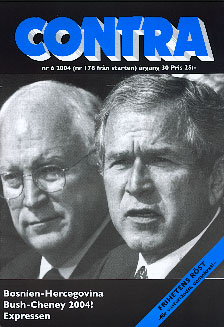
Contra looks at Expressen,
by Tommy Hansson
After our look at ”Svenska Dagbladet”, the now disgustingly leftist ”conservative” newspaper in Stockholm in Contra # 4 2003, we this time look at ”Expressen” which used to be the largest newspaper in Northern Europe, but have dropped significantly in circulation during the past decade. Expressen, in spite of its yellow press background, seems to be much more reliable than Svenska Dagbladet. And in spite of the ”liberal” roots of Expressen, it definitely runs a more right-wing policy than the so-called ”conservative” Svenska Dagbladet.
Bosnia and Hercegovina still divided,
by C G Holm
Bosnia and Hercegovina was the area that was located at the crossroads between Austria-Hungary and the Ottoman Empire of the Turks, during the Turkish offensive against Europe in the middle of the last millenium. To the north were catholic Croatia and Slovenia, integrated parts of the Habsburg Empire. To the east was orthodox Serbia, which was controlled by the Turks from the mid 15th century to the beginning of the 19th century. Many Serbs opted to flee across the border to Slavonia (nowadays the eastern part of Croatia) or Hungary. To the south were Albania and Kosova, where the Albanian population converted to islam in order to gain a preferential treatment bythe Turkish Sultan. Bosnia and Hercegovina was divided among Croatians, Serbians and Moslems. And in spite of the peace agreement and no open hostilities, the country is still very much divided, with the Serbian parts more oriented towards Belgrade than to Sarajevo and the Croatian parts similarily oriented towards Zagreb. There are few joint Bosnian and Hercegovinian authorities, almost all of the ministries and authorities run parallell by the constituting parts of Bosnia and Hercegovina.
Anti-semitism during the centuries
A never tired lecturer against anti-semitism is the Dr of theology Göran Larsson, formerly employed by the Institute of the Church of Sweden in Jerusalem, but nowadays living in Brazil. Larsson became aware of anti-semitism when refugees from Nazi Germany arrived to his childhood province of Västergötland.
Jesse Helms – most important after Reagan and Bush, by Bertil Häggman
At the side of Ronald Reagan and George W. Bush, the North Carolinian Senator Jesse Helms was probably the most important American Conservative politician during the last century.
Claus von Stauffenberg and the assault on Hitler, by Tommy Hansson
Claus Schenk Graf von Stauffenbergs tried to kill Adolf Hitler in the bunker city close to Rastenburg (Polish Ketrzyn) in East Prussia. The attempt was made July 20 1944, 60 years ago. Stauffenberg’s attempt is the most well-known, as it was part of a large plot to topple the Nazi government. But the assasination attempt of the carpenter George Elser November 8 1939 in Munich, was more well-prepared, and failed only because of a change in the Hitler schedule.
Settler extremism, a threat against Ariel Sharon, by Allan C. Brownfeld
Almost a decade after the murder of Prime Minister Yitzhak Rabin, political murders are once again in focus in Israel. Security services warn against an imminent threat, when radical rabbis openly debate how to violently resist the Knesset decision to evacuate Jewish settlements in so-called occupied territories.
Peter the Great – the world’s worst taxman,
by Fredrik Runebert
Charles Adams has written the book For Good and Evil: The Impact of Taxes on Course of Civilization. The book deals with the impact of taxes on civilization in a historical perspective. Charles Adams sees taxation as a crucial factor in the flow of history. He points out the Russian Czar Peter the Great (early 18th century) as the world’s worst taxman

